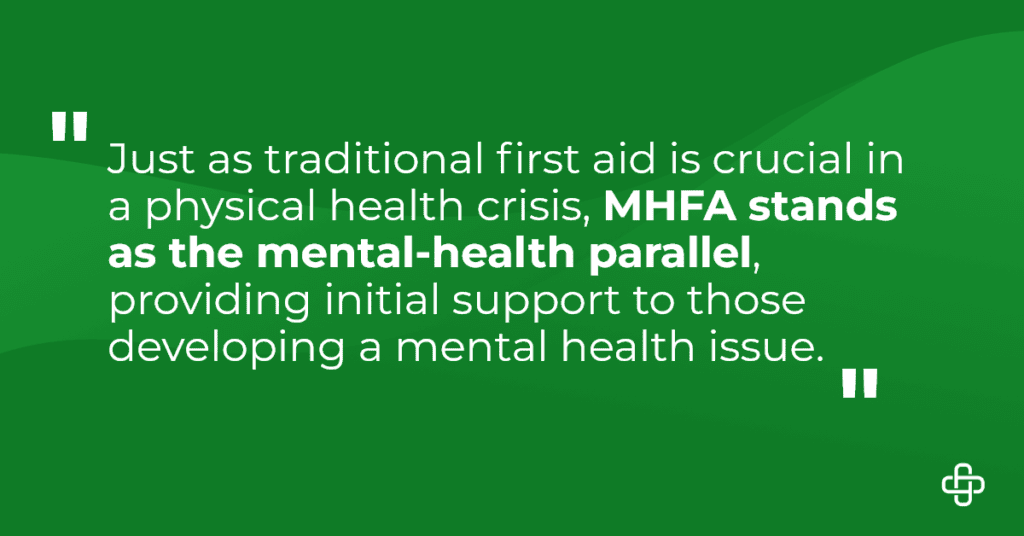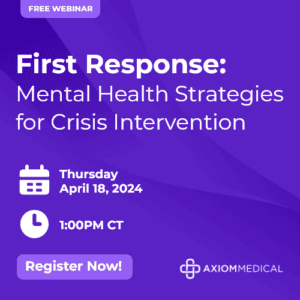Mental health has emerged as not just a footnote in the employee care manual but a critical chapter rewriting how we approach overall health management.
Enter Mental Health First Aid (MHFA), an increasingly vital program finding its way into the heart of company health strategies.

Understanding MHFA: The Mental Counterpart to Physical First Aid
Just as traditional first aid is crucial in a physical health crisis, MHFA stands as the mental-health parallel, providing initial support to those developing a mental health issue.
The core of MHFA training is to enable a first aider to offer practical assistance until appropriate professional treatment is received or until the crisis resolves. In essence, MHFA empowers individuals to recognize, understand, and respond to signs of mental illnesses and substance use disorders.
Mental Health First Aid Objectives
MHFA carries several core objectives:
- Increase understanding and empathy for those struggling with mental health issues.
- Reduce stigma surrounding mental health struggles.
- Equip professionals with the skills to support someone showing signs of mental health challenges.
- Encourage early intervention and effective care.
How MHFA Differs from Traditional First Aid
The most significant distinction lies in its domain; MHFA deals with invisible wounds, providing a framework to address often complex and varied mental health challenges. The program offers a consistent method for providing support that is crucial to sustaining employee performance and well-being within an organization.
The Impact of Mental Health First Aid in the Workplace
Organizations that have embraced MHFA report myriad benefits that ripple across their operations, from increased productivity to higher retention rates. By fostering a climate of understanding and prompt support for mental health concerns, companies are fulfilling their ethical obligations and bolstering their business advantage.
Empowering Employees
MHFA turns everyday employees into advocates for mental health. The program equips participants with the tools to engage with and assist individuals in emotional distress, ultimately contributing to a more cohesive and resilient workforce.
Reducing Stigma and Discrimination
One of the critical benefits of MHFA is the role it plays in shifting organizational culture towards one that is accepting and supportive of mental health discussions, thereby diminishing the fear and discrimination often associated with mental illness.
Overcoming the Implementation Hurdle
Introducing MHFA into a corporate framework has its fair share of hurdles. Recognizing and surmounting these challenges is a key milestone in realizing the full potential of the strategy.
Common Obstacles
Companies often face challenges such as staff resistance, integrating MHFA with existing health resources, and identifying appropriate responders.
Strategies for Success
Addressing these challenges calls for innovative solutions, like promoting a clear understanding of the program, garnering senior management buy-in, and establishing a model for integrating MHFA champions throughout the organization.
Mental Health First Aid Legal and Ethical Frameworks
Implementing MHFA brings forth a set of legal and ethical considerations that cannot be overlooked. From duty of care to confidentiality, organizations must navigate these waters with informed sensitivity.
Employer Responsibilities
With the rise of mental health awareness, employers must recognize their responsibilities in providing a workplace that is physically safe and mentally supportive.
Confidentiality Concerns
Anonymity and the protection of employees’ intimate health information are paramount. Proper training safeguards privacy and ensures that employees feel secure in seeking help when they need it.
Steps to Plant the MHFA Seed in Your Workplace
Now that we’ve explored the essentials, it’s time to roll up our sleeves and plant the MHFA flag in your work environment. Here are actionable steps to initiate the process:
- Education and Awareness- Begin with the basics, ensuring that all staff are educated on the program’s fundamentals and its salient role in business health.
- Building a Supportive Infrastructure- Create a network of support that includes Mental Health First Aiders and access to professional mental health services for employees in need.
- Leadership and Culture- Leaders set the tone. Encourage executives and managers to champion MHFA, leading by example to foster a culture that values and supports mental health initiatives.
Measuring the Success of MHFA
Pinning down the effectiveness of MHFA in numbers is crucial for ongoing support and improvement. Here’s how to keep score:
- Quantifiable Metrics: From incident reports to employee surveys, gather tangible data that reflects the shift in mental health response and outcomes.
- Feedback Mechanisms: Develop a system that continually solicits feedback from participants and those who receive MHFA support. This will allow you to refine the program based on real-world responses.
MHFA isn’t a one-time implementation—it requires perpetual grooming to remain effective and relevant.
In Conclusion: Prioritizing Mental Health in the Workplace
The case for Mental Health First Aid is compelling and clear. By adopting it, companies can fulfill their legal and ethical obligations, nurture a more productive workforce, and contribute positively to societal attitudes about mental health.
If you’re an employer, make it a mission to assess, plan, and implement MHFA within your organization.
For those ready to take the next step, consider contacting MHFA training providers. Remember, a small investment in mental health resources can yield immeasurable dividends in your employees’ well-being and your company’s success.
Are you ready to deepen your understanding and enhance your mental health crisis intervention skills?
Check out this free webinar replay of “First Response: Mental Health Strategies for Crisis Intervention,” for an engaging session filled with invaluable insights and strategies.
Don’t miss this opportunity to expand your knowledge and toolkit for addressing mental health crises. Your proactive learning in this area will not only position you as a key support resource in times of need but also contribute to a larger culture of mental wellness and understanding.
Charli Pedersen is a published writer featured on Axiom Medical’s blog. She holds a bachelor’s degree in English, Professional and Technical Writing, and has experience creating content for businesses and non-profit organizations.










